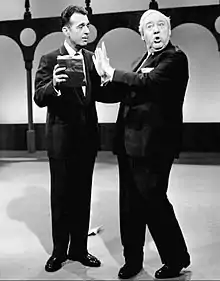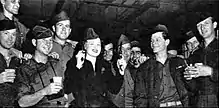The Ford Show
The Ford Show (also known as The Ford Show, Starring Tennessee Ernie Ford and The Tennessee Ernie Ford Show) is an American variety program, starring singer and folk humorist Tennessee Ernie Ford, which aired on NBC on Thursday evenings from October 4, 1956, to June 29, 1961.[2] The show was sponsored by the Ford Motor Company, whose founders shared a last name with the host but had no known relation.[3] Beginning in September 1958, the show was telecast in color, and was broadcast from NBC Studios at 3000 W. Alameda Avenue in Burbank, California.[4] It is also one of the first places that showed Charles M. Schulz's Peanuts characters in animated form, which, like the later specials, was directed by Bill Melendez. It became one of the most popular segments of his show.[5][3][6][7]
| The Ford Show | |
|---|---|
 Tennessee Ernie Ford asks his guest star, Charles Laughton, to read a poem from the "brown paper bag" poet, Fred Wobbly. | |
| Also known as |
|
| Genre | Variety |
| Written by | Norman Lear[1] Roland Kibbee[1] |
| Directed by | Bud Yorkin |
| Starring | Tennessee Ernie Ford |
| Composer | Harry Geller's Orchestra |
| Country of origin | United States |
| Original language | English |
| No. of seasons | 5 |
| No. of episodes | 121 |
| Production | |
| Producer | Bud Yorkin |
| Camera setup | Multi-camera |
| Running time | 25 minutes |
| Release | |
| Original network | NBC |
| Original release | October 4, 1956 – June 29, 1961 |
Selected guest stars


Production notes
The Ford Show was produced and directed by Bud Yorkin.[9] Television icon Norman Lear was also a writer on The Ford Show,[1] though he has claimed that Roland Kibbee was in fact the show's main writer and that he merely wrote the opening monologues.[10][1] Lear has also stated that both Yorkin and Kibbee were in charge on the show's production.[10] The program was officially named not for the host, but for the show's sponsor, the Ford Motor Company.[11]
See also
- For other TV series sponsored by Ford Motor Company, see Ford Television Theatre, Ford Startime, Ford Festival, and Ford Star Jubilee
References
- Gray, Tim (October 30, 2015). "Norman Lear Looks Back on Early Days as TV Comedy Writer". Archived from the original on February 6, 2018. Retrieved December 13, 2017.
- Hyatt, Wesley (1997). The Encyclopedia of Daytime Television. Watson-Guptill Publications. pp. 425–426. ISBN 978-0823083152. Retrieved March 22, 2020.
- "The Ford Show/Tennessee Ernie Ford Show". classictvhits.com. Archived from the original on November 21, 2010. Retrieved November 23, 2010.
- "ClassicTVHits.com: TV Ratings". www.classictvhits.com. Archived from the original on October 6, 2012. Retrieved January 19, 2015.
- "Ladies and Gentlemen: Tennessee Ernie Ford". ernieford.com. Archived from the original on November 28, 2010. Retrieved November 21, 2010.
- "Amazing Grace: Forty Treasured Hymns". barnesandnoble.com. Retrieved November 21, 2010.
- "Biography: Tennessee Ernie Ford". ernieford.com. Archived from the original on February 2, 2011. Retrieved November 21, 2010.
- "Pig-Tailed Blonde Has Role as Lana Turner's Daughter". Long Beach Independent-Press-Telegram. March 1, 1959. p. A11. Retrieved October 29, 2022.
- Alex McNeil, Total Television, pp. 824–825
- Archived at Ghostarchive and the Wayback Machine: "Norman Lear talks about the Tennessee Ernie Ford Show , which Lear wrote for in the beginning o..." YouTube.
- Brooks, Tim; Marsh, Earle (2003). The Complete Directory to Prime Time Network and Cable TV Shows, 1946–Present. New York: Random House. p. 425. ISBN 0-345-45542-8. Archived from the original on February 18, 2022. Retrieved November 21, 2010.